Bush - bin Laden family business connections
the Bush dynasty has closer links to the bin Ladens than Saddam Hussein did
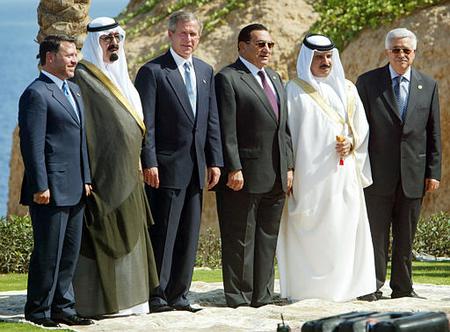
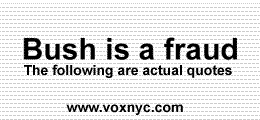
Michel Chossudovsky http://www.spectrezine.org/war/Chossudovsky3.htm
"The war on terrorism is an integral part of Bush’s National Security Doctrine . It is being used as a pretext for waging war on Iraq. Many antiwar activists are unaware that successive US administrations have over the last 20 years supported Islamic terrorism including Al Qaeda . The latter is a creation of the CIA. It is a key instrument of US foreign policy"
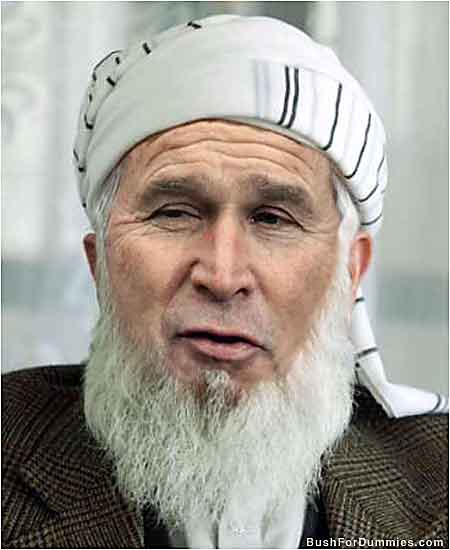
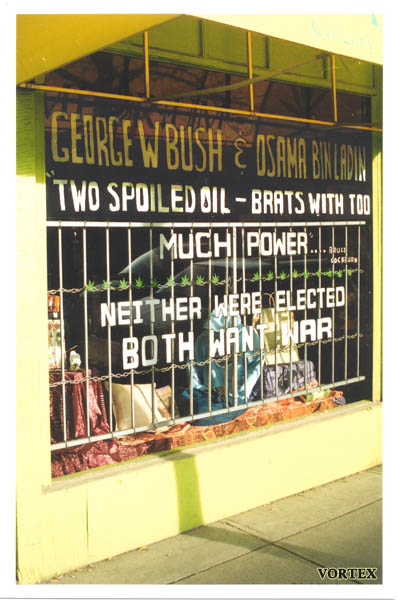
www.questionsquestions.net/bushladen/bushladen_chart.htm
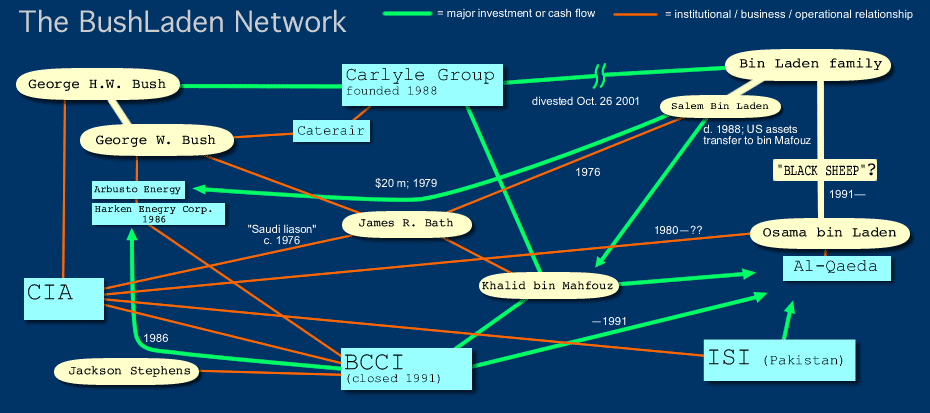
note: Jackson Stephens was, until recently, the employer
of General Wesley Clark
and was perhaps the most important financial backer of Presidential Candidate Bill Clinton. It's a small world.

See No Evil: What Bush Didn't (Want To) Know About
9/11
TomPaine.com
Saturday, March 1, 2003
Did Our President Spike The Investigation Of Bin Laden?
by Greg Palast
http://gregpalast.com/detail.cfm?artid=195&row=0
... I still didn't have an answer to all my questions. We knew that Clinton and the Bushes were reluctant to discomfort the Saudis by unearthing their connections to terrorists -- but what made this new president take particular care to protect the Saudis, even to the point of stymying his own intelligence agencies?
The answers kept coming back: "Carlyle" and "Arbusto."
While some people have guardian angels, our president seems to have guardian sheiks....
Behind Carlyle is a private, invitation-only investment group whose holdings in the war industry make it effectively one of America's biggest defense contractors. For example, Carlyle owned United Technologies, the maker of our fighter jets. Carlyle has the distinction of claiming both of the presidents Bush as paid retainers. Dubya served on the board of Carlyle's Caterair airplane food company until it went bust. The senior Bush traveled to Saudi Arabia for Carlyle in 1999. The bin Ladens were among Carlyle's select backers until just after the 9/11 attacks, when the connection became impolitic. The company's chairman is Frank Carlucci, Bush Sr.'s former defense secretary. The average Carlyle partner has gained about $25 million in equity. Notably, Saudi Prince Al Waleed bin Talal bin Abdul Aziz employed Carlyle as his advisor in buying up 10 percent of Citicorp's preferred stock. The choice of Carlyle for the high-fee work was odd, as the group is not an investment bank. One would almost think the Saudi potentate wanted to enrich Carlyle's members....

San Francisco peace rally, October 26, 2002
The Bush-Saudi Connection
www.hermes-press.com/BushSaud.htm
"even as the hijacked planes smashed into the World Trade Center,
the Carlyle Group was holding its annual investor conference. Shafig Bin
Laden, brother of Osama Bin Laden, attended"
www.judicialwatch.org/press_release.asp?pr_id=1624
www.geocities.com/burningbush2000/3.html
www.inthesetimes.com/issue/25/25/feature3.shtml
http://emperors-clothes.com/news/bushladen.htm
www.aci.net/kalliste/homepage.html#todnews
www.smh.com.au/news/0109/27/world/world14.html
www.guardian.co.uk/Print/0,3858,4288516,00.htm
www.thewinds.org/2001/10/10.html
http://baltimorechronicle.com/media3_oct01.shtml
www.bushwatch.net/bushmoney.htm
www.onlinejournal.com/Attack_on_America/Hatfield-R-091901/hatfield-r-091901.html
Why would Osama bin Laden want to kill Dubya,
his former business partner?
By James Hatfield
Editor's note: In light of last week's horrific events and the Bush administration's
reaction to them, we are reprising the following from the last column
Jim Hatfield wrote for Online Journal prior to his tragic death on July
18:
July 3, 2001—There may be fireworks in Genoa, Italy, this month, too.
A plot by Saudi master terrorist, Osama bin Laden, to assassinate Dubya during the July 20 economic summit of world leaders, was uncovered after dozens of suspected Islamic militants linked to bin Laden's international terror network were arrested in Frankfurt, Germany, and Milan, Italy, in April.
German intelligence services have stated that bin Laden is covertly financing neo-Nazi skinhead groups throughout Europe to launch another terrorist attack at a high-profile American target—his first since the bombing of the USS Cole in Yemen last October.
According to counter-terrorism experts quoted in Germany's largest newspaper, the attack on Dubya might be a James Bond-like aerial strike in the form of remote-controlled airplanes packed with plastic explosives.
Why would Osama bin Laden want to kill, Dubya, his former business partner?
I knew that bombshell would whip your heads around. So here's the straight scoop, folks.
In June 1977, Dubya formed his own drilling company, Arbusto Energy ("arbusto" means "bush" in Spanish), in Midland, Texas. Like his father before him, Dubya founded his oil business with the financial backing of investors, including James R. Bath, a Houston businessman whom Dubya apparently first met when they were in the same Texas Air National Guard unit. (Interestingly, both Dubya and Bath were both suspended from flying in August and September 1972, respectively, for "failure to accomplish annual medical examination.")
Tax documents and other financial records show that Bath, an aircraft broker with controversial ties to Saudi Arabia sheiks, had invested $50,000 in Arbusto, granting him a 5 percent interest in two limited partnerships controlled by Dubya.
Time magazine described Bath in 1991 as "a deal broker whose alleged associations run from the CIA to a major shareholder and director of the Bank of Credit & Commerce." BCCI, as it was more commonly known, closed its doors in July 1991 amid charges of multibillion-dollar fraud and global news reports that the financial institution had been heavily involved in drug money laundering, arms brokering, covert intelligence work, bribery of government officials and—here's the kicker—aid to terrorists.
Bath was never directly implicated in the BCCI scandal, but according to The Outlaw Bank, an award-winning 1993 book by Time correspondents, Jonathan Beaty and S.C. Gwynne, Bath originally "made his fortune by investing money for [Sheikh Kalid bin] Mahfouz and another BCCI-connected Saudi, Sheikh bin Laden," reportedly the brother of none other than Osama bin Laden, the man accused by the U.S. government of masterminding the August 1998 terrorist bombings of the American embassies in Kenya and Tanzania which killed more than 250 people.
According to court documents, Bath swore that in 1977 he represented four prominent and wealthy Saudi Arabians as a trustee and used his name on their investments in the United States. In return, he received a 5 percent interest in their deals. Time reporters Beaty and Gwynne suggest in their book that the $50,000 Bath invested in Dubya's Arbusto Energy drilling company may have belonged to Bath's Saudi clients since the Houston businessman "had no substantial money of his own at the time."
The FBI and the Financial Crimes Enforcement Network later investigated Bath after allegations were made by one of his American business partners that the Saudis were using Bath and their giant piggy bank to influence U.S. policy. (Dubya's father had been appointed by President Ford to head the CIA from 1976–77.)
So, folks, the Middle Eastern oil money used to underwrite the first business venture of our future president of the United States, may have been derived at least in part from the family fortune of Saudi terrorist Osama bin Laden, who is now being accused of masterminding his assassination.
From the what-it's-worth-department: I think Dubya's handlers have fed disinformation through the CIA and other backdoor channels to German and Italian intelligence agencies about a possible hit on Dubya by the fugitive terrorist to gain public sympathy and concern for a U.S. president who has taken a nose-dive in the opinion polls.
The latest New York Times/CBS News poll showed Dubya's approval rating fell to 53 percent from 57 percent a few weeks ago, its lowest since he took office. Only 50 percent of those polled approved of his handling of the economy, while 47 percent approved of his foreign policy performances. Some 44 percent felt Dubya was not respected by foreign leaders, a mere 39 percent agreed with his policies on the environment, and a whopping 61 percent of Americans believed the new prez was not addressing the issues they care most about.
Obviously, the pollsters didn't call Dubya's sugar daddies—the oil and gas companies. Because he damn sure is taking care of their interests.




